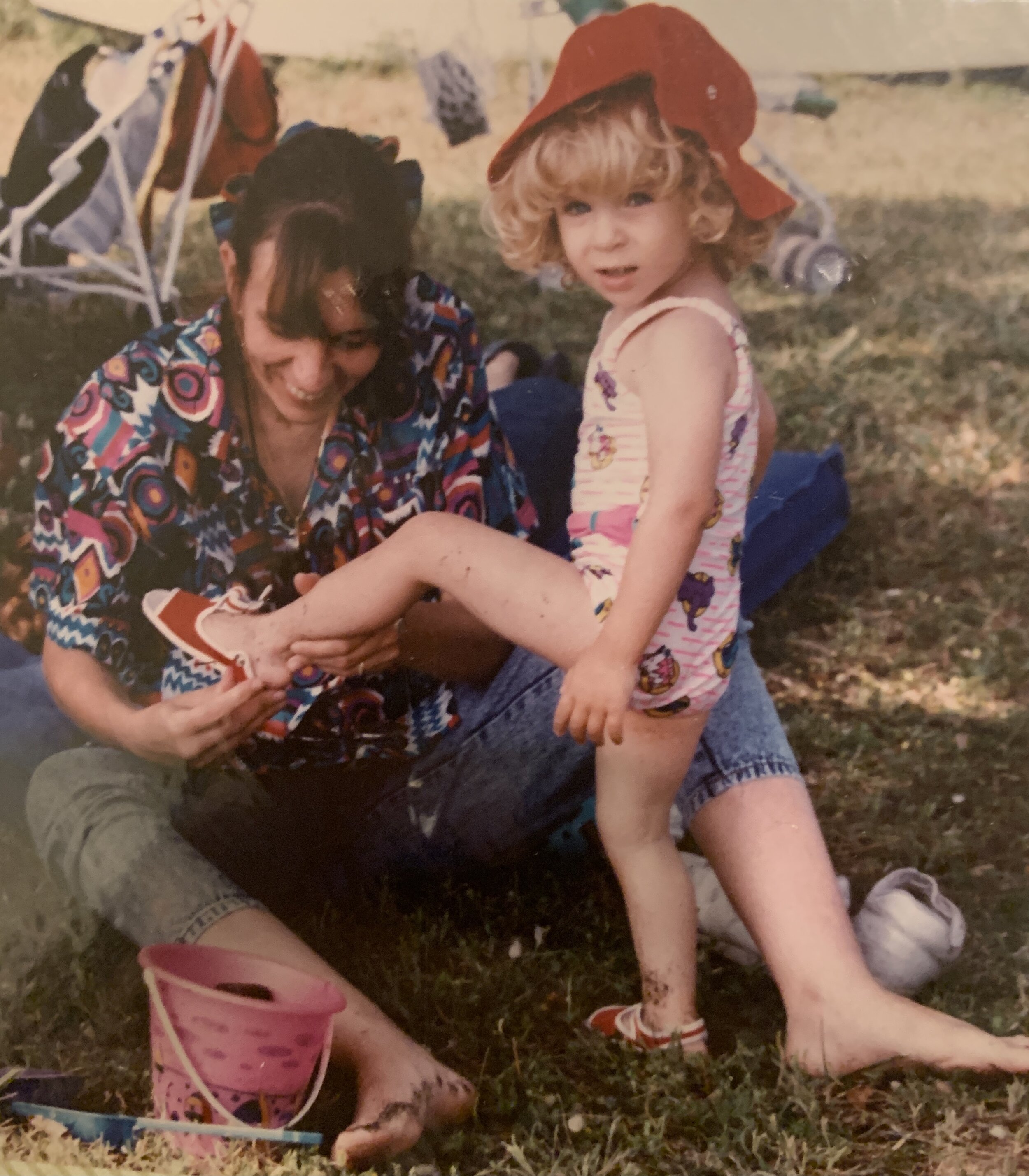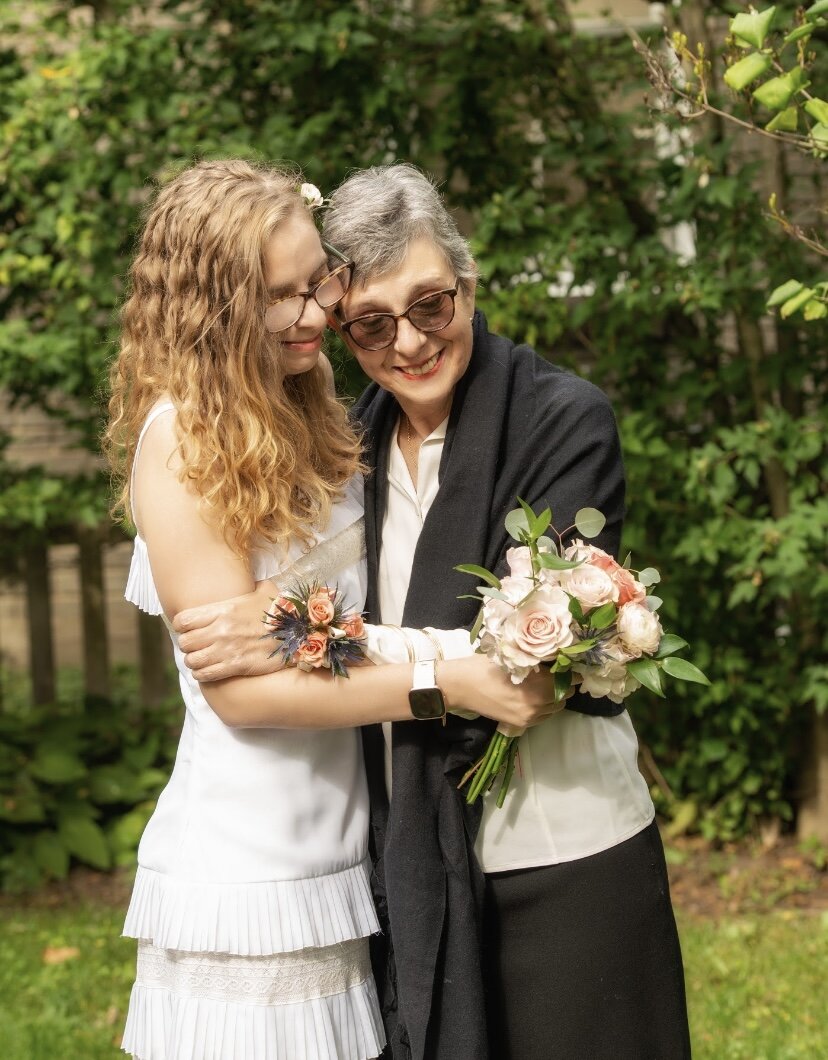Veronica’s Story
May is hard. For most of us who read this blog in the US, May means Mother’s Day, and for me, it was my first one without her. On top of this, May is also my parents’ wedding anniversary and the sixth-month marker since my mother’s death on November 20, 2020. Before I experienced this loss, I never truly understood how a late loved one could be on your mind every day. I naively thought it was an exaggeration. It’s not. Not a day goes by that I do not think about her. Every day, every moment is coupled with a pinch of sadness that I can no longer interact with her as I once did. Her absence is in everything I do, and everything I will do. However, this made me realize that this constant absence can also be interpreted as a perpetual presence. Because my mom can no longer be here as she was, my todays and tomorrows forever have her weaved in. It is not the same, but it is a lovely thought.
During my mother’s two months in hospice, I promised her that I would eventually be okay and that I would see her in every beautiful thing I saw and did. In part, I said this to bring her ease, as she knew her absence would bring me and my father (as well as everyone who loves her) so much pain. What I didn’t realize then is that my own words serve as a way through this grief. She loved life, all its moments, contact, and lessons. One way I can keep her close is by realizing that everything I do or see can now be a love letter to her.
Particularly since the start of her hospice care and the months after her death, I’ve turned to various grief support platforms, conversations, and contemplations. One of these was philosophy and esotericism, which given my academic background makes sense. While I am far from an expert, before I briefly introduce you all to mi mami, I want to share how—indebted to so many before me—I’ve come to understand consciousness and its relationship with both life and death. This line of thought helps me grapple with the grief I feel knowing that so much of my future will no longer look as I had once imagined it would.
My partner, Alexandre, introduced me to Arthur Schopenhauer and his philosophy on our world and death. While I have not read all of his works, what attracted me most to Schopenhauer was his metaphor for understanding life and our consciousness as it relates to trees. He states that we as humans falsely identify with the leaf of a tree that in autumn changes and ultimately falls to its supposed death. He invites us to consider that we are in fact the force of the tree, that which grows, changes, and dies only to grow again. Everything is connected. Physics teaches that energy cannot be created nor destroyed, it simply changes and transforms. This made me think about some Hermetic principles of the interconnection of all things, of vibrations and extensions, of how the all is one. So while yes, my mom as I knew her is no longer here, the energy that made her who she was continues all around me and in a way, as a part of me. A tiny piece of her is in everything beautiful I see just as I too one day will be. Indeed, from my corporal perspective, it will never be the same, but the push, the will to live, that which made her “her”, never disappeared.
My whole life I knew my mom did amazing things, but she was always primarily my mother. Now that her body is gone, I am beginning to see her as a whole, as more than just “mom.” She was a pioneering and accomplished woman who inspired so many. Another one of my grief outlets has been to document her life in a book based on an interview I did with her ten years ago in an undergrad women’s oral history course, which I supplement with more details and descriptions. I plan to create multiple editions so that it will never be truly complete but rather something my father and I can return to and augment as more memories or nuggets resurface. While that project will be more private, I do want to share a brief overview of her life for the world to see.
María Cristina, the oldest of three siblings, was born in Buenos Aires, Argentina on June 21, 1950. From a young age, she and her family of five were surrounded by music and concerts. My grandfather was a composer and organist so music organically became part of the whole family. At the time they received the loving nickname of the “familia Trapp argentina” as phrased in a 1970 news article alluding to the von Trapp family singers whose lives had recently been adapted for the 1965 world-famous film musical, The Sound of Music. When she was only 20 years old, my mom earned a Masters in choir direction and became the first woman choir director of Argentina with earlier degrees and licenses in primary school education, piano, and music theory. She loved learning and her interest in music lead her to speech-language pathology and audiology, which she supplemented by working with various choir groups alongside patients in her private clinic and hospital consultations. Her drive and passion for both learning more and helping others did not stop there. With the support of the Rotary Club she supplemented her doctoral studies in Paris, France where she received a title in general phonetics before returning to Buenos Aires to defend her PhD.
Quickly Paris became her favorite city. She fell in love with the food, the people, the language, and contrary to her initial intention, with a similarly expatriated-Argentine man completing his PhD in mathematics—my dad, José Luis. Time passed and they married May 9, 1981 at Saint-Germain de l’Auxerrois just across from the Louvre. Shortly after they moved to Michigan and a new adventure began. While at the time she barely spoke English, soon, with hard work and determination, it became the fifth language she could communicate in. She started off by assisting with voice identification and as an adjunct professor while still maintaining her ties and affiliations in Paris, Buenos Aires, and Rome in the form of temporary visiting positions and collaborations. She also became a staff member of various hospitals in Michigan and in 1991 co-founded the Lakeshore Professional Voice Center. This she did just a year after I, their only child and “miracle baby” was born. After its founding she created the Center’s “Sister Program” alongside her colleagues, which established an international exchange with South America and Spain. Through this program she and others from the Center would train otolaryngology, medicine, and speech-language pathology residents. This program has hosted many throughout the years and it has now been renamed to honor my mother, a gesture I find very beautiful.
Indeed, she had so many professional accomplishments and international recognition, but never once did I feel her absence growing up—not even when I moved out of Michigan almost ten years ago. No matter how busy she was, she always made time for me and those she loved. Our house perpetually smelled of fresh bread, French desserts, and delicious meals. Our piano resonated with her touch sending waves of music throughout. She always had time to chat on the phone or enjoy a film at night with me and my dad while she knitted sweaters. No matter her fame, what truly characterized her was her passion and humility. She had this amazing ability to connect with people, to make them feel seen and heard. Never did she make anyone feel inferior but rather established a bond of mutual respect and offered help to family, friends, and even my own friends. There was little she set her mind to that she could not achieve and it is this drive that she wanted to instill in everyone she met: whatever it is you want to do, you can, you just have to start. As I grew up, both she and my father would tell me that I was what they were most proud of out of all their accomplishments. While it feels like a lot of pressure, I am honored to be but one way her legacy continues. So much of who I am is because of her and I am forever grateful.
Roughly five years ago my mom first received the news that she had double-negative breast cancer. After some surgeries and radiation, things were in good order until a little under three years later it came back, this time even more aggressive and triple-negative—one of the hardest to treat. Nonetheless, she fought. She endured even more surgeries and attempted chemotherapy which had almost fatal side effects. While things seemed under control for the following months, the last blow was when doctor’s confirmed the cancer’s aggressive spread throughout her whole body and we started her two months of home hospice care where my father and I, both teaching remotely at the time, were able to care for her. I don’t want to dwell too much in these difficult moments, but I want to share my theory on cancer. Maybe her cancer’s aggression and persistence are a reflection of her own strength and perseverance. I absolutely am not implying that she made this happen, but rather that since cancer comes from our cells, perhaps her cancer was so persistent because of her own life force that had such a strong will to live and expand. Anything she did, she gave it her all. I wish so much I could still have her here with me, but since I can’t, I will continue to learn from her and face any tribulation with grace and an open heart, just as she did. Even more than that, I will remind myself that while the “leaf” I knew her as is gone, what made her is still here and everywhere.
Fuerza y amor to all who face or one day will face this grief. Our loved ones’ “leaves” may have fallen but despite the sadness may we never forget to see the “tree” and see all the ways in which they still remain.
-Veronica

